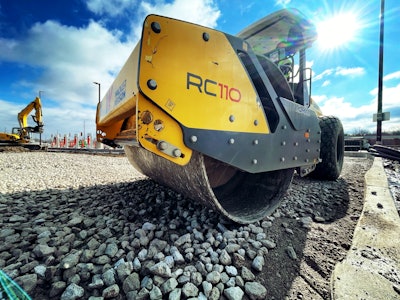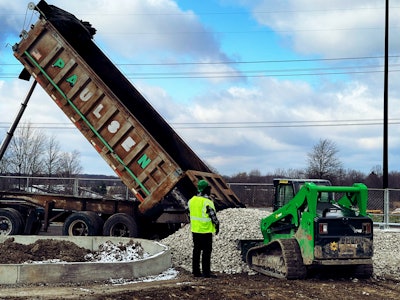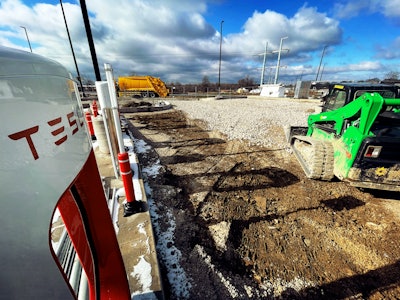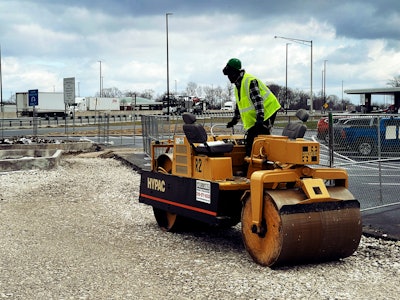
Starting a business and managing a business aren't the same thing. While they both require a certain amount of boldness and self-determination (and perhaps just a dash of brazenly-acquired luck), once you have your idea up and running, the running part is what can burn you out, trip you up, or spell the end.
Maybe you're at the point where you've started the side-hustle, making ends meet with extra work, and it's doing well and you're considering growing or taking things full-time. Maybe you're considering launching the start-up, but things haven't come together yet. Or maybe your business has been sitting on idle for a little while now, and you want to know how to take it to the next level. Whatever point you are at on the spectrum, your business journey will require not only taking risks, but taking the right risks at the right time.
That's a daunting task, to be sure, but in this month's cover story we went out and spoke to a number of business owners who all came into their parts of the industry through different methods. One started from nothing, one rescued a struggling group from closure, and another bet big on a often misunderstood piece of pavement repair technology that paid off in a huge way. They all share a lot of commonalities, but one of the most relevant is their willingness to forge their own pathway toward their goals, even when the decisions they made might have seemed unconventional or too risky at the time.
When Working For Yourself Means You Can't
The day that I caught up with James, he was fixing a site of one of Ohio's new electric vehicle (EV) charging stations along the I-80 Turnpike. It was all set to be paved, when sudden rains came in and washed everything out. It was well below freezing that day so, between laying "1s and 2s" and compacting, we warmed up in our cars and talked about how he got his start and worked up to where he is now. Brandon Noel
Brandon Noel
James is the owner of Erie Northern, a site preparation company that completes excavation and base/sub-base work, often hand-in-hand with local paving contractors like Holland Paving in Northeast Ohio. When he launched the company in 2018, they had only one tandem axle hauling truck to their name. It wasn't new, but it ran, and it got the job done. But in those early days, there was just one problem. Ed James' company couldn't afford Ed James.
"Back at the time we started, I couldn't pull a paycheck to provide for me and my family and the company be profitable," James told me from the seat of his excavator.
The solution was one I never would have imagined. He ran Erie Northern, while working full time for other companies. James explained, "Yeah, I'm a member of the Local 18 International Union of Operating Engineers, and so I took work for Carron Asphalt Paving and The Shelly Company, all union outfits, as I worked to build my business at the same time." James' company utilizes Local 18, as well.
I told James, whom I was meeting for the first time, that it was the wildest thing I'd heard. Standing there in the icy cold temperatures I said, "I bet they don't teach that one at business school."
How did he do it? Not easily. It was a constant battle, juggling cell phones, dispatchers, and schedules -- but in the end it paid off. Just four years later, the company now has a fleet of seven trucks and growing. Best of all, James no longer works for anyone else simultaneously. He now just works for himself.
Reaching for the Stars, Sitting in a Pickup Truck
There are other paths for aspiring business owners to take, however, because not everyone goes all-in the way Ed James did. What works for some, doesn't work for others. There are many contractors who got their by just doing the work on the side, by themselves, out of the back of the pickup truck. This is especially true of people who work as asphalt pavement sealers. Everyone has seen trucks, now and then, driving around their neighborhoods with large tanks in the back. Lots of start-up sealing businesses get into the industry this way, according to Girish Dubey, the president of Star Seal, a company that produces a variety of sealants and additives.
Dubey has been in and around the industry for more than 50 years, and the president of Star Seal since 1987. I asked him directly, about what percentage of contractors who are successful sealers and maintenance outfits started out of the back of just one truck. "Oh, I would say well more than half likely get their start that way," Dubey told me.
Over the years, he has seen lots of contractors come and go, along with hosts of changes in the industry itself. Shifts in environmental regulations, materials and economic environments all play a huge role in the ups and downs of a business, especially in the pavement maintenance industry.
However, he felt that the thing that mattered most, consistently amidst all the other changes, was properly educating yourself on the materials and the tools at your disposal.
"It doesn't matter if all you have is that one truck and a squeegee," Dubey said, "The quality of the work will speak for itself to whomever your client base is. It grows from there."
From Dubey's side of the desk, I couldn't help but ask what he could share about running a large business with 22 locations, that smaller, locally owned businesses could take and apply to how they operate.
"It is the same," Dubey said. "The same things still apply, no matter what your size. Taking the time for proper education, the correct methods--these are the difference makers. In our industry there is a huge amount of turnover. About 10-15% don't stay with it. This is a big problem, and I think that it can be partially addressed by making resources more available to those who are serious and want to learn. And many of them are hungry to learn."
Taking advantage of the resources is a major factor, like participating in industry functions, events, webinars and conferences like the IGNITE Construction Summit, NPE, as well as many others. Businesses of every size, growing or established, need to stay informed on the most up-to-date products and industry standards to best serve their client base. And when you serve your customers better, it lays the groundwork for real success. Brandon Noel
Brandon Noel
Taking the (Bumpy) Road Less Traveled
Taking risks always comes with one certainty. There will be no shortage of people who feel it is there role to come and explain to you what you're doing wrong. I have found that it is a lot easier to be a Monday-morning quarterback, than to actually put some skin into the game. When it's your time and money on the line, you can't subject yourself to the whims and opinions of ever single outsider that comes your way. Sure, every business manager should have a trusted circle of people they can count on to "tell it like it is" with them, but that's not what I mean. Sometimes, you've got to make your own way and tune out the noise.
For instance, I spoke with Dynamic Chief Operating Officer Zach Young of Potholes Heroes, a pavement patching and repair contractor based out of southern Florida. What's interesting about Young's approach to growing his business, was the tools he chose to invest in, as well as how he utilizes them differently than most other contractors in his field do. Frequently, it is the case that pothole repair and asphalt pavement patching is a side portion of business for pavement contractors who's primary focus and source of business is paving itself. Young's company takes a different approach, utilizing an array of infrared tools, hot boxes, and reclaimers--it's their whole business.
What surprised me was how much pushback Young described getting from other contractors in the industry. Young said, "I was in the Nashville airport, talking to a guy and he just straight up tells me that infrared isn't as good, that it takes too much time, or that it doesn't last as long. I mean, to me it just made me want to know more, but that's my nature. If someone gets that way about something like that, I'm kind of contrarian that way. I've got to find out for myself, and I did." That personal investigation led Young and Potholes Heroes to grow into a hugely successful pavement repair and maintenance network, which has spread nearly statewide, and that speaks for itself.
Young said that the infrared technology hasn't been the only divergence in running his business that draws the odd look from those on the outside looking in. He has his own approach to operations management that is a far cry from the traditional methods, but he makes a compelling argument. "If our crews have five days worth of work to do," Young said, "and they get it done in three days. Then--BYE! Have a nice two days off then."
I couldn't help but laugh along with him. The idea is so strikingly simple, that it borderlines on the absurd when you say in the context of the way a business might operate. However, Young says it has proven successful.
"We aren't looking to squeeze our crews for every possible minute, that just burns people out, they leave, and then you have to start over again with new hires," he said. "I think that's a reason we've had some success in our recruitment and turnover, as well."
Thinking Outside The Box
Another way to find avenues for business growth is to find gaps or needs in a given market, and devise a way to either solve the problem better than it's currently being addressed or to solve one that seemingly is being overlooked. The place to start is always with the target audience of your given market, doing a little investigation and research goes a long way.
Mike Blake, marketing director of KM International, a manufacturer specializing in pavement repair and recycling machines, and based out of North Branch, Michigan, described the way the company wholly developed a new product based simply on a customer asking if it was possible. At first, they weren't sure that it was, but, rather than turning them away, they just got to work on figuring it out. This too carried some risk. Expending resources and time on a project that wasn't guaranteed to result in success.
Blake recounted it, "A lot of the hot box trailer variations we sell started just like that. A lot of the solutions we come up with happes by just saying let's go out on the floor and start welding, and see what we can come up with." Brandon Noel
Brandon Noel
That's a potential avenue for people on the hardware side of things, but in today's pavement and pavement maintenance world, the software you choose (or the lack thereof) to incorporate as your business grows can be the difference maker due to the volatility in the supply chain. The better you can plan, the better possibility of success. But building software is, also, about meeting the needs of those who use it. As a business, establishing open channels of communication with your clientele is a vital component to growth.
Kerin Hughes, the CEO of Pavement Management Pro, a recently-launched management platform designed to support contractors in the paving and pavement maintenance sector, spoke about their team's development process.
"We're continuing to get the customer feedback even now on a monthly basis," Hughes said. Leading up to launch they went through several rounds of testing and refinement until they felt the product was something actually useful to contractors.
"What it came down to is: what do they need right where they're at," Hughes continued. "Let's create a program that will actually help these guys out based on their workflow. How do they actually do business? Let's create a program that makes that easier and connects the paving guy with a stripping guy, with a sign installation guy, and so on. It's one big circle."
The Bottom Line, The Bottom Dollar
Every business is a system. They are complex. What that means is that there does not exist simple, easy answers to how to grow, increase sales, and, ultimately, be more successful. Any secret answers that are easy and sound too good to be true, are too good to be true. That doesn't mean that there aren't any answers at all, it's just more than likely that those answers will require you take a risk.
A risk of more of your time. A risk of greater capital investment. A risk of trying something outside the established norm. It wont guarantee success, nothing truly will, but there is one guarantee you can count on in your business. If you don't take any risk at all, you severely limit the possible future of your business.






![Screen Shot 2023 01 04 At 5 23 30 Pm[35]](https://img.forconstructionpros.com/files/base/acbm/fcp/image/2023/01/Screen_Shot_2023_01_04_at_5.23.30_PM_35_.63bc42696de27.png?auto=format%2Ccompress&fit=crop&h=167&q=70&w=250)












